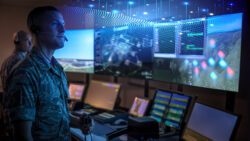Charles River Analytics Inc., a developer of intelligent systems solutions, has announced a contract awarded by the National Aeronautics and Space Administration (NASA) to measure and assess astronaut workload. The system for Cognitive Assessment and Prediction to Promote Individualized Capability Augmentation and Reduce Decrement, or CAPT PICARD, will measure, assess, and predict cognitive workload to assist astronauts or mission control in responding more effectively.
Astronauts sent on manned NASA missions face long periods of minimal cognitive workload followed by sudden, high tempo operations. In addition, disrupted sleep, long-term motion exposure, and lack of normal gravity, may impair cognitive and psychomotor functioning, resulting in fatigue, stress, and decreased mood.
“In CAPT PICARD, we are building an unobtrusive system to measure, assess, and predict astronaut cognitive workload,” said Dr. Bethany Bracken, a scientist at Charles River Analytics, and Principal Investigator on CAPT PICARD. “This will allow us to warn astronauts or mission control when steps should be taken to augment cognitive readiness. We can also use CAPT PICARD to assist engineers in evaluating the cognitive and physical demands of new tools during their initial design, and to determine the effects these tools will have on task performance and accuracy. We will use Charles River’s proprietary probabilistic modeling and deep learning techniques to sift through data from a suite of neurophysiological, physiological, and behavioral sensors, and interpret that data into indications of human state, such as cognitive workload, to help predict upcoming performance decrements before they occur.”
Charles River will build upon recent NASA efforts in the CAPT PICARD system. In 2014, it was awarded a contract to improve aviation safely using probabilistic programming in NASA’s Programming Useful Life Prediction effort. Charles River also received a contract for a satellite image processing system to detect large-scale environmental events.




